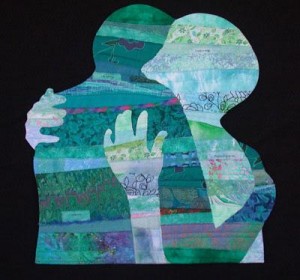Toward Forgiveness
Finding the Wisdom We Need to Survive
by Robert C. Koehler
I’m far more interested in forgiveness than justice.
 An Iraqi mom, 32 years old, is beaten to death in her house in El Cajon, Calif. A note by her body reads: “Go back to your country, you terrorist.†Was it a hate crime? An isolated incident?
An Iraqi mom, 32 years old, is beaten to death in her house in El Cajon, Calif. A note by her body reads: “Go back to your country, you terrorist.†Was it a hate crime? An isolated incident?
Dehumanization, the death of the human soul, is now reaching an advanced stage and its consequences are spreading across the country and the planet like global warming. I feel my own immune system breaking down. I can’t absorb the news anymore without hearing a deep alarm go off somewhere, insistent, berserk.
So I think about the deaths of Trayvon Martin and Shaima Alawadi and the Afghan civilians allegedly murdered by a lone, drunk American soldier (with the implausibility of the official scenario of yet another lone gunman growing in magnitude) and I feel myself groping for so much more, in all these tragedies, than — at best — the discharge of sterile justice.
And we’re told he could get the death penalty, the ultimate in sterile, meaningless justice, especially considering that it would be the outcome of a U.S. military trial and serve the purpose of shutting up the scapegoat for good. We know, in our hearts and guts, that something more is necessary here than the playing out of bureaucratic logic, as though the murder of 17 people is a procedural error. This is not a matter of “break the rule, pay the fine,†yet as a society we lack sufficient wisdom to think about it any other way.
“It is an Ojibway teaching,†writes Rupert Ross in Returning to the Teachings, “that healthy relationships — and ‘a good life’ — depend on constantly cultivating seven attributes: Respect, Caring, Sharing, Kindness, Honesty, Strength and Humility.â€
I refrain, as a matter of spiritual discipline, from turning even neighborhood-watch gunman George Zimmerman into my enemy or nailing his arrogantly grimacing picture up at my personal altar of hate, much as I shudder at the Florida law that empowered him, allowing him to “stand his ground,†stalk and murder a black teenager.
“Western law,†writes Ross, “seems to assume we are captains of our own ships and that each of us is equally capable of moving out of antisocial behavior on our own, just by deciding to do so. Traditional wisdom suggests that each of us rides a multitude of waves, some stretching back centuries, which we cannot fundamentally change and which will still confront us tomorrow.â€
Understanding this, I wish only for a moment of collective calm and a social shift toward forgiveness. Let the moment be fleeting, but let us feel the harm we keep inflicting on ourselves and then both seek and bestow forgiveness for all we have done. And let us drop our weapons, if only for that moment, so we can understand that it’s possible.
Robert C. Koehler is an award-winning, Chicago-based journalist and nationally syndicated writer. His new book, Courage Grows Strong at the Wound is now available. Contact him at koehlercw(at)gmail(dot)com or visit his website at commonwonders.com.

In the Babemba tribe of South Africa, when a person acts irresponsibly or unjustly, he is placed in the center of the village, alone and unfettered. All work ceases, and every man, woman and child in the village gathers in a large circle around the accused individual. Then each person in the tribe speaks to the accused, one at a time, about all the good things the person in the center of the circle has done in his lifetime. Every incident, every experience that can be recalled with any detail and accuracy is recounted. All his positive attributes, good deeds, strengths and kindnesses are recited carefully and at length. The tribal ceremony often lasts several days. At the end, the tribal circle is broken, a joyous celebration takes place, and the person is symbolically and literally welcomed back into the tribe.
1